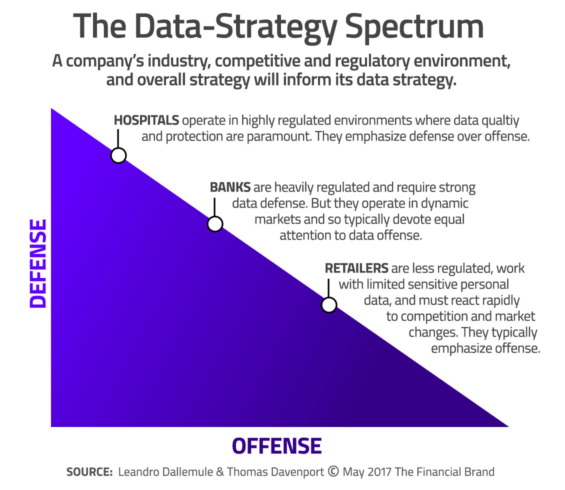Protect Your Business with Data Strategy
Cyber Security is a threat for bigger as well as smaller firms:
We are all well aware of Yahoo’s biggest data breach last year, which resulted in not only a loss of $50 million but also, the company’s reputation got severely damaged as over 1 billion accounts were hacked. So what exactly happened with a company like Yahoo? Some external sources hacked into one of the world’s top companies with highest security systems; while hundreds of employees were actively guarding the servers through advanced security softwares, but the hackers still managed to find a loophole and succeeded in cracking the code. However, Yahoo got lucky enough and was acquired by another company called Verizon, which now will take all the measures towards keeping Yahoo secure, but unfortunately, small businesses don’t get any of such luxury of external funding, and that’s why they fail to protect their data and repute.
Why do Small Businesses need to protect their data?
Most of the owners of smaller businesses think that security of data is just the concern for bigger firms, but the truth is that smaller companies are 80% more vulnerable to security breaches as compared to the bigger ones. Why? The answer is quite simple and straightforward, bigger companies already know the worth of their data and hence, they keep on improving their security systems and making it harder for the hackers to crack such systems. However, startup firms easily get targeted and lose all their funding to pay for the damage they’ve encountered through the loss of their data. That’s why it is extremely crucial for your company to start working on coming up with strategies to protect your valuable data. Before we start discussing some of the data protection strategies, let us first realize the consequences of cyber attacks for small businesses.
Attack on Reputation:
When customers come to know, about any previous security attacks on your company’s website, they become hesitant to use credit cards’ information, contact details or other sensitive particulars. This situation can lead towards losing your sales, targets and potential clients. Once your company’s reputation has been hit, it will take years and years to earn the trust back from your customers.
Loss of Company Assets:
Loss of your data means losing your customers and employees secret information, your company’s credentials, log in details, passwords, bank accounts, etc. All these assets, once yours will then become the property of someone else, and you can do nothing other than paying a hefty amount of money to get it back, still with no guarantee to receive it unaltered.
High Costs:
After the attack, the outer damage may seem a little in the beginning, but the loss which the company will bear over time in terms of losing customer relationships, previous sales records, insurance premium raises, etc will be far more than expected and will cost huge amount of time and money to get back to the original state.

Data Strategies to Protect Your Business:
One of the biggest mistakes you can make as an entrepreneur is being unprepared and inactive. If you’ve finally decided to protect your company’s data then go ahead and follow these basic strategies. An important thing to keep in mind is that no technology, agency, or approach can give a 100% guaranteed solution towards guarding your data, but you should do whatever you can, in your capacity to protect your business data from cyber thieves.
Antivirus Software:
Investing in buying good, reliable antivirus software is never a bad idea. Companies like McAfee, Kaspersky, and AVG, etc are all great options to choose from. Also making purchases in the categories of firewalls and malware detectors will be super beneficial to detect any attacks before their occurrence.
Data Encryption:
All sensitive information must be encrypted including emails, chats, and any other communication mediums. Also, all electronic devices like servers, cloud storage devices, mobile phones, laptops, etc must use encrypted softwares like 7zip, AxCrypt, etc to protect any unwanted data leakage.
Sound Governance and Establishing a Security Policy:
Take out the time to formally write down the security policies you use in your company. Whether you have 2 employees or 200, you need to make sure the process they are following is safe, properly secured and 100% according to the rules and regulations, mentioned in your company’s security policy.
Backing up all the Critical Data:
This is the best time to start using cloud storage if you have not started yet. Since, the data on the cloud can still be accessed quite easily, you need to back up all your critical data into a cloud as well as a physical storage media, so that if unfortunately your data gets attacked, you can still be able to access it through that physical media and you will be able to confidently deny all the financial demands from cyber thieves.
Multi-factor Authentication:
Just like we use two-factor authentication, to ensure that we are the ones who are trying to log into our accounts, similarly protecting our businesses data with multi-factor authentication can prove very helpful. If somehow the attackers manage to get access to your username and password, they will have to access the credentials of a third device which will become quite difficult for them and will, in turn, safeguard your critical data.
Training your Employees:
We believe this to be the most important strategy out of all the above mentioned. Training and educating your employees about the importance of data security, the consequences of cyber attacks, the damage they can bring to the company and the preventive measures, which the employees can take in their day to day operations to avoid any mishap, is really important. Most of the cyber attacks, when studied in detail, were the results of human errors, which somehow resulted in data leakages and made it easier for the attackers to enter those systems. If the employees are trained well enough to predict such attacks before their occurrence, we can expect huge amounts of improvement in the overall security of companies and their data.
